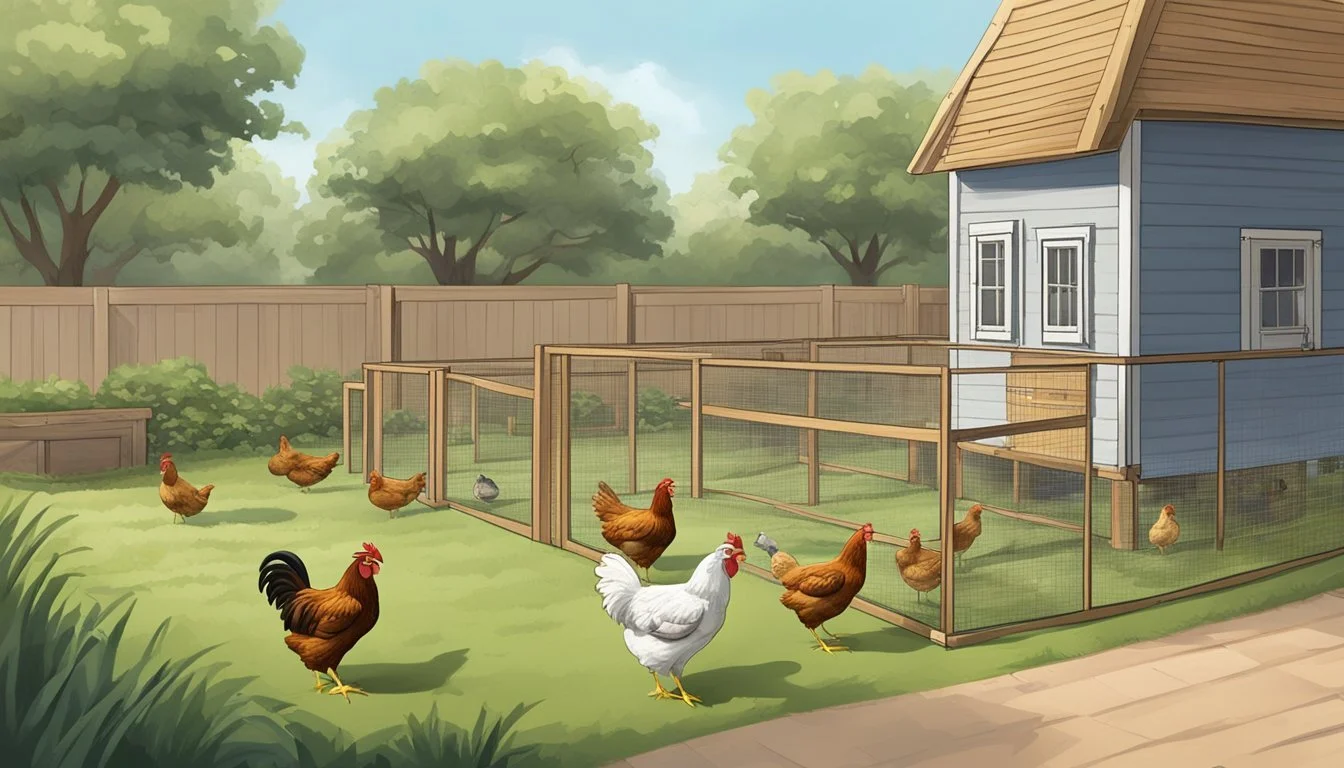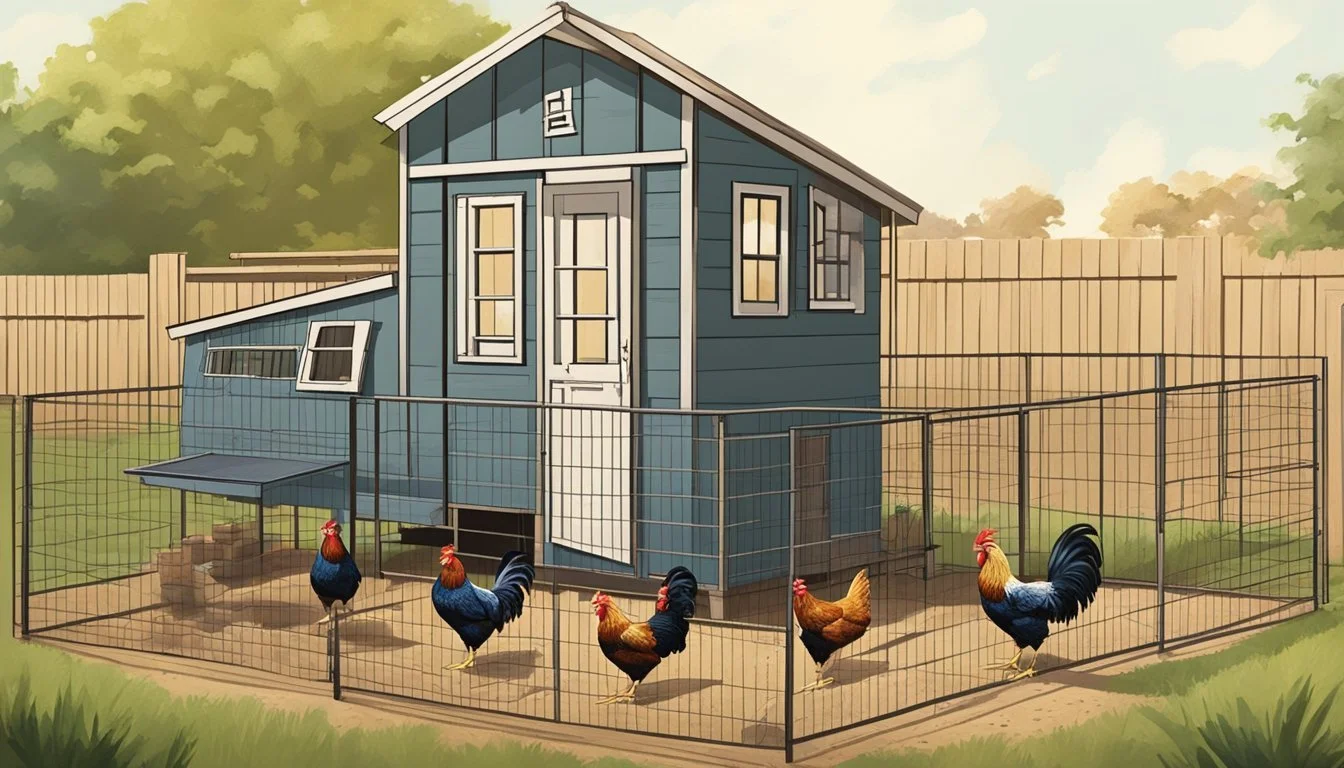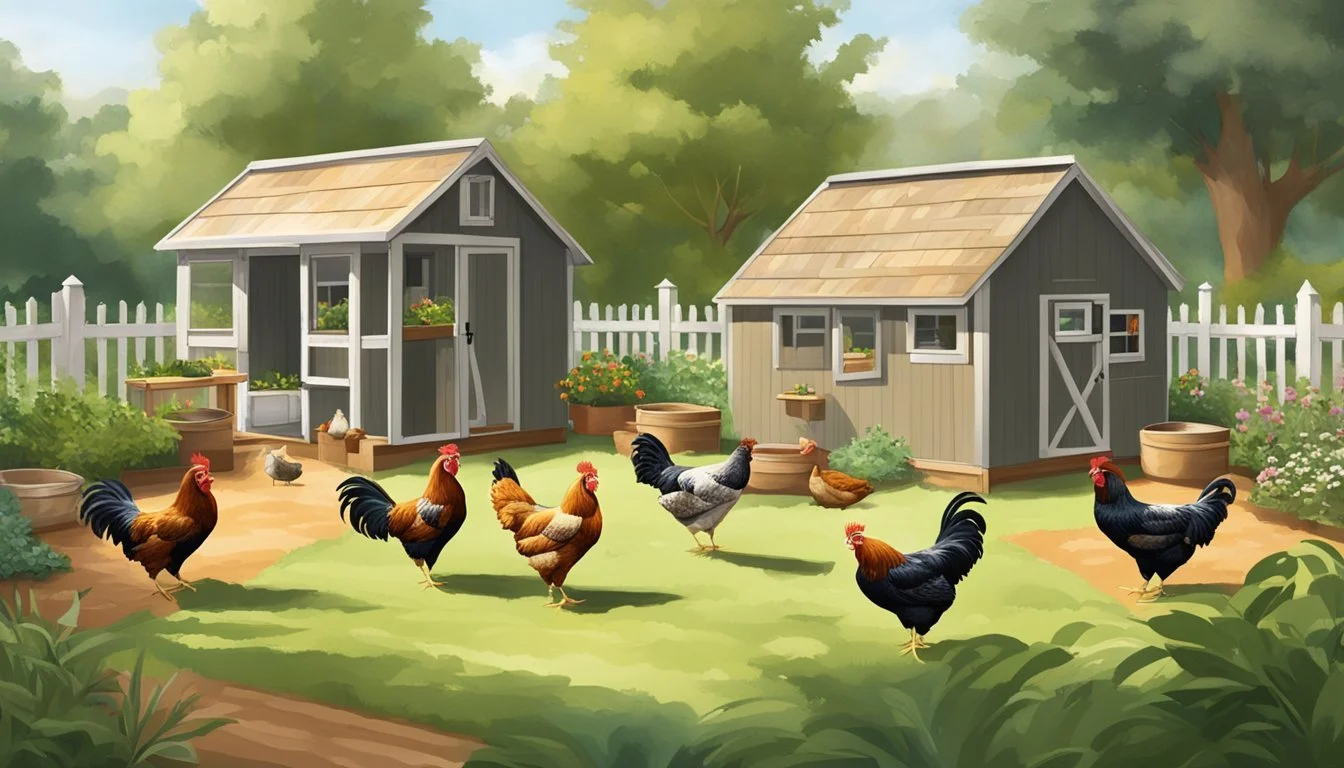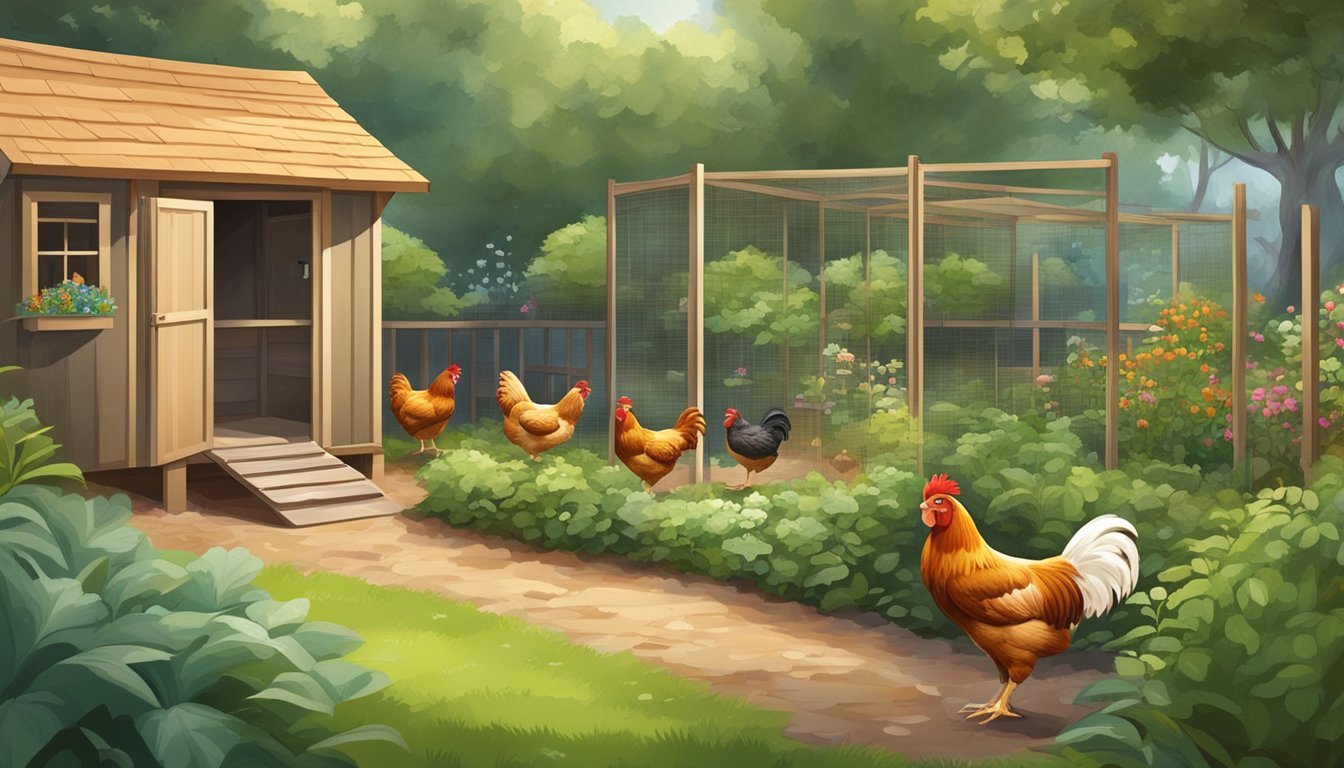Keeping Backyard Chickens in College Station, TX
Essential Guidelines for Residents
Backyard chicken keeping is on the rise in College Station, TX, reflecting a growing movement towards self-sufficiency and local food sourcing. The practice, bolstered by recent changes in local ordinances, allows residents to enjoy fresh eggs from their own property. In addition to providing a reliable food source, raising backyard chickens can offer educational opportunities and the pleasure of caring for animals.
Meeting the needs of both urban and rural communities, College Station has established specific guidelines to regulate the keeping of chickens within city limits. These regulations ensure that the activity remains harmonious with community standards and the local environment. It is vital for potential and current chicken keepers in College Station to stay informed about these rules to maintain a compliant and productive backyard flock.
The benefits of having backyard chickens are numerous; however, they come with responsibilities such as proper housing, care, and adherence to city guidelines. College Station residents embarking on this venture contribute to a sustainable lifestyle while navigating the ordinances designed to balance urban agricultural pursuits with the dynamics of city living.
Understanding Local Ordinances
Residents of College Station, Texas, considering raising backyard chickens must navigate a variety of local ordinances. These regulations are key to ensuring responsible and compliant chicken ownership within city limits.
City Council and Regulations
The College Station City Council has enacted specific regulations pertaining to the housing and management of fowl, including chickens. An amendment, led by Police Chief Billy Coach, details these regulations to maintain community standards and address any concerns about animal housing within the city's jurisdiction.
Permits and Restrictions
Individuals must adhere to certain permits and restrictions when raising backyard chickens. Understanding the particular requirements, such as coop specifications, distance from neighboring properties, and the number of chickens allowed, is crucial. Non-compliance with these regulations may result in fines or other penalties.
Zoning and Residential Areas
Zoning laws significantly influence where and how residents can keep chickens. College Station's Unified Development Ordinances dictate that residents in residential areas must follow specific guidelines that govern the presence of livestock within city boundaries, ensuring harmony with the neighborhood and city policies.
Setting Up Your Backyard Coop
In College Station, TX, setting up a backyard coop involves strategic placement, robust design for protection, and ensuring a healthy environment for your chickens.
Choosing the Right Location
For your home backyard chicken coop, the location is critical. In College Station, individuals should look for a spot that has level ground to prevent flooding and provides partial shade to protect from the Texas heat. Placement should be far enough from neighbors to adhere to any local regulations and to minimize noise and odor concerns.
Coop Design and Security
When constructing the coop, a sturdy enclosure is vital for keeping your flock safe. Each chicken requires at least 4 square feet inside the coop, and an outdoor yard or run should also be included. Protection from predators is a major concern in Texas, where wildlife such as raccoons and opossums are common. Ensure the coop is secure with strong wire mesh and locks to deter these threats.
Maintaining a Healthy Environment
A well-maintained coop is key to preventing disease and promoting health. Water should be abundant and clean, so invest in a large capacity waterer. For waste management, College Station residents can implement a regular cleaning schedule, and possibly consider a deep litter method to minimize labor and maintain coop health. Adequate ventilation is critical to ward off respiratory issues, while the coop must be kept dry and draft-free.
Daily Care and Management
Proper daily care and management are crucial for the well-being of backyard chickens in College Station, TX. They not only ensure the health of the chickens but also contribute to the quality of the eggs produced.
Feeding and Nutrition
Chickens must have access to a balanced feed that meets all their nutritional needs. Provide a consistent supply of commercial poultry feed, which typically comprises grains, proteins, vitamins, and minerals. Owners should supplement this with kitchen scraps and garden produce. It's important to avoid toxic foods like chocolate or avocado. Fresh water must be refilled daily to maintain hydration.
Daily Feed Requirements:
Starter feed for chicks (< 6 weeks)
Grower feed for pullets (6-20 weeks)
Layer feed for hens (> 20 weeks)
Supplements (in moderation):
Crushed oyster shells for calcium
Grit for digestion
Health Monitoring and Disease Prevention
Regular observation helps in early disease detection and maintaining the overall health of the flock. Check for signs of distress, unusual behavior, or changes in egg production. Preventative measures such as vaccinations and parasite control are essential. Coops should be cleaned and disinfected regularly to prevent disease spread.
Health Checklist:
Clear eyes and nostrils
Smooth feathers
Regular egg laying
Preventative Actions:
Quarantine new or sick birds
Maintain vaccination schedule
Managing Waste and Odor
Effective waste management is important to keep the coop clean and minimize odors. Remove droppings daily from the coop. Compost the waste or use it as fertilizer in non-edible gardens. Bedding should be refreshed regularly to prevent the buildup of moisture and bacteria. Ensure proper ventilation within the coop to keep it dry and odor-free.
Daily Maintenance:
Scoop droppings
Check bedding moisture
Weekly Routine:
Replace bedding
Clean waterers and feeders
Engaging With the Community
When keeping backyard chickens in College Station, TX, it is crucial to navigate local ordinances and community relations effectively. Whether addressing neighbor concerns or promoting the benefits of backyard chickens, clear and considerate communication is key.
Addressing Neighbor Concerns
Residents considering backyard chickens should first familiarize themselves with College Station's local ordinances. As of the recent updates, chicken enclosures must be at least 50 feet from adjacent houses, a reduction from the previous requirement of 100 feet. Additionally, the allowable number of domestic fowl per residence is capped at six. Should neighbors have complaints, the city has the authority to revoke residents' permits to maintain their fowl. It is essential for prospective chicken keepers to engage in open dialogues with their neighbors to mitigate potential complaints regarding noise, odor, or encroachment.
Promoting Backyard Chickens and Self-Sufficiency
Promoting the concept of backyard chickens centers on educating the community about the advantages of self-sufficiency and the joy of harvesting fresh eggs. Advocates in College Station can highlight the benefits, such as reduced food waste, natural pest control, and the joys of caring for animals. Utilizing social platforms such as Facebook groups, local online forums, and city council meetings can be effective ways to foster community support and share information about proper chicken keeping practices.
Educational Resources and Forums
For those interested in backyard chickens, College Station offers avenues for education and discussion. Individuals can reach out to Animal Control for guidance on compliance with local ordinances and to address any concerns about keeping chickens in urban settings. Local city council meetings provide a forum for public discourse on regulations and community standards. Moreover, online forums and Facebook groups dedicated to backyard poultry serve as valuable resources for sharing tips, troubleshooting common issues, and connecting with a network of experienced chicken keepers in the community. These platforms can play a pivotal role in fostering a well-informed and cooperative environment for the pursuit of backyard poultry endeavors.
Legal Considerations and Compliance
In College Station, Texas, residents must navigate a patchwork of state and local laws to legally keep backyard chickens. Careful compliance is paramount as ordinances are regularly updated and can vary from one jurisdiction to another.
Understanding State and City Laws
Texas does not have a statewide law that specifically governs the keeping of backyard chickens, leaving the bulk of regulation to cities and counties. In College Station, the City Council has updated local ordinances to allow residents to keep backyard chickens under certain conditions. For instance, the minimum distance requirement between chicken enclosures and a homeowner's dwelling has been reduced from 100 feet to 50 feet, with a stipulation for a probationary period. Additionally, the number of allowed chickens is capped at six.
Minimum Distance: 50 feet from dwelling
Chicken Limit: 6 chickens per household
Residents are advised to consult with the College Station City Council for the most recent ordinances and to ensure their compliance with local chicken laws.
Handling Legal Disputes
Should legal issues arise, residents are encouraged to resolve chicken-related disputes in accordance with both state and local regulations. In College Station, new nuisance regulations apply to the keeping of chickens, introduced to address and mitigate any disputes regarding noise, odor, or other community concerns.
Nuisance Regulations: Compliance required to address community concerns
Dispute Resolution: Check local resources for guidance
It is recommended to stay informed about local resources available for mediating and resolving disputes that may occur due to backyard chickens.
Future Planning and Legislation
Long-term compliance also involves staying informed about potential changes in chicken laws and regulations. College Station residents should monitor actions by the City Council, which holds the authority to modify existing rules or implement new ones.
Stay Informed: Regularly check for updates from the City Council
Participate: Residents may have the opportunity to give input on proposed changes
As regulations evolve, proactive engagement with future planning and legislation can help ensure continuous lawful chicken keeping in College Station.
Additional Considerations
When deciding to keep backyard chickens in College Station, TX, owners should consider several additional factors such as the local climate, the impact on the ecosystem, and the differences between urban and rural chicken-keeping practices. These considerations ensure the welfare of the chickens, compliance with local regulations, and harmony with the community.
Climate and Weather Factors
The climate in College Station is characterized by hot summers and mild winters. Backyard chicken owners should therefore prioritize:
Shade and Ventilation: Ensuring that chicken coops provide ample shade and cross-ventilation to combat the Texas heat.
Water Supply: A constant, fresh water supply to prevent dehydration during extreme temperatures.
Chickens as Part of the Local Ecosystem
Chickens can directly interact with the local ecosystem, making it crucial for owners to understand their impact:
Pest Control: Chickens can help control pests naturally, reducing the need for chemical interventions.
Plant Protection: Owners should safeguard their gardens and native plants, as chickens can damage local flora while foraging.
Chickens in Urban vs. Rural Settings
The context of College Station's urban environment vs. rural areas influences how chickens are kept:
Neighbor Considerations: In urban settings, it is particularly important to maintain a small flock to minimize disturbances and adhere to local regulations, which, for instance, may limit the number of chickens to six and require coops to be at least 50 feet away from the owner's dwelling.
Space Requirements: Rural chickens often benefit from more space, which can promote healthier fowl and reduce neighbor complaints common in denser, urban locales.
By addressing these considerations, residents of College Station can ensure a responsible and community-friendly approach to keeping backyard chickens.







